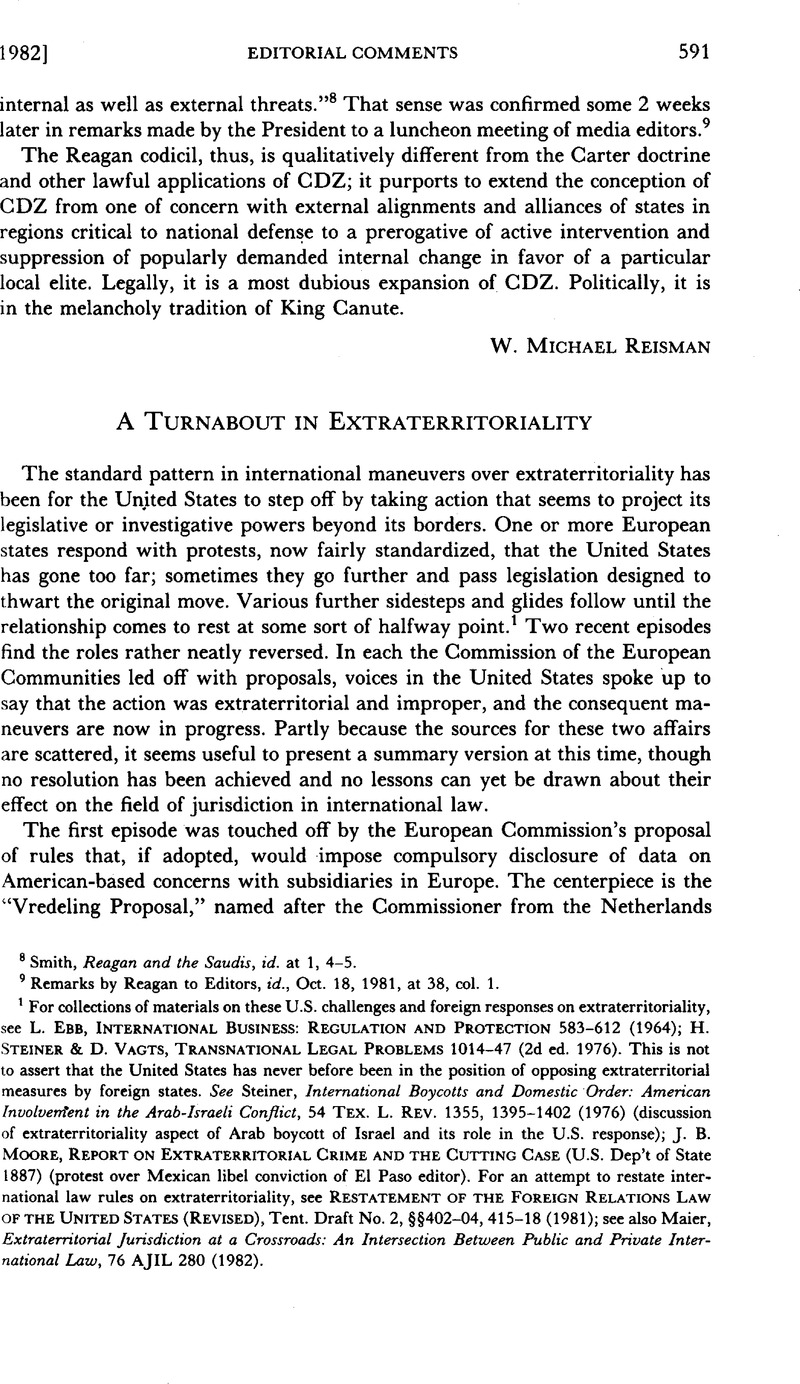Article contents
A Turnabout in Extraterritoriality
Published online by Cambridge University Press: 27 February 2017
Abstract

- Type
- Editorial Comments
- Information
- Copyright
- Copyright © American Society of International Law 1982
References
1 For collections of materials on these U.S. challenges and foreign responses on extraterritoriality, see Ebb, L., International Business: Regulation and Protection 583–612 (1964)Google Scholar; Steiner, H. & Vagts, D., Transnational Legal Problems 1014–47 (2d ed. 1976)Google Scholar. This is not to assert that the United States has never before been in the position of opposing extraterritorial measures by foreign states. See Steiner, , International Boycotts and Domestic Order: American Involvement in the Arab–Israeli Conflict , 54 Tex. L. Rev. 1355, 1395–1402 (1976 Google Scholar (discussion of extraterritoriality aspect of Arab boycott of Israel and its role in the U.S. response); J. B. Moore, Report on Extraterritorial Crime and the Cutting Case (U.S. Dep’t of State 1887) (protest over Mexican libel conviction of El Paso editor). For an attempt to restate international law rules on extraterritoriality, see Restatement of the Foreign Relations Law of the United States (Revised), Tent. Draft No. 2, §§402–04, 415–18 (1981); see also Maier, , Extraterritorial Jurisdiction at a Crossroads: An Intersection Between Public and Private International Law , 76 AJIL 280 (1982)CrossRefGoogle Scholar.
2 23 O.J. Eur. Comm. (No. C 297) 3 (1980).
3 For an argument that such actions would have to be notified, see Kirkland, , Multinationals—Bad News Brewing , Fortune, Dec. 14, 1981, at 142, 144 Google Scholar.
4 22 O.J. Eur. Comm. (No. C 14) 2 (1979) (7th directive); the 9th directive has not as yet been published, though it has evidently been circulated informally for comments. Both are based on Article 54(3)(g) of the Treaty of Rome. See generally Stein, E., Harmonization of European Company Laws (1971)Google Scholar.
5 The British Act and its purposes are discussed in Lowe, , Blocking Extraterritorial Jurisdiction The British Protection of Trading Interests Act, 1980 , 75 AJIL 257 (1981)CrossRefGoogle Scholar. A similar French law is treated in Herzog, The 1980 French Law on Documents and Information, id. at 382.
6 H.R. 4339, 97th Cong., 1st Sess. (1981), and S. 1592, 97th Cong., 1st Sess. (1981). A bill with somewhat similar objectives that would amend the Trade Act of 1974 to authorize the President to respond to foreign practices that discriminate against U.S. foreign investment is H.R. 4407, 97th Cong., 1st Sess. (1981).
7 The history of the Government’s case is reported as United States v. International Business Machs. Corp., 69 Civ. 200, 4 Trade Reg. Rep. (CCH), Case No. 2039. For decisions in private cases, see, e.g., Telex Corp. v. International Business Machs. Corp., 510 F.2d 894 (10th Cir.), cert, dismissed, 423 U.S. 802 (1975); In re IBM Peripheral EDP Devices Antitrust Litig., 481 F.Supp. 965 (N.D. Cal. 1979).
8 International Business Machs. Corp. v. Commission, Case No. 60/81, Nov. 11, 1981, Common Mkt. Rep. (CCH) ¶8708. Technically, the procedure attempted was a suit to declare void the acts of the Commission initiating a proceeding and the statement of objections about IBM’s practices. In addition to extraterritorial grounds, IBM relied upon procedural irregularities by the Commission.
9 Wall St. J., March 31, 1982, at 1, col. 6.
10 E.g., Schott, , Can World Trade Be Governed? , Challenge, March/April 1982, at 43 Google Scholar.
11 This point is elaborated in the forthcoming volume, C. Wallace, The Multinational Enterprise: Legal Controls: Techniques of Industrialized Host States and the Prospects for International Controls.
- 1
- Cited by




